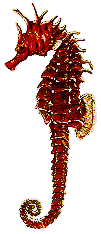 Synonyms: Hippocampus brevirostris Slestenenko, 1936
Synonyms: Hippocampus brevirostris Slestenenko, 1936Hippocampus guttulatus microstephanus Slestenenko, 1937
 Synonyms: Hippocampus brevirostris Slestenenko, 1936
Synonyms: Hippocampus brevirostris Slestenenko, 1936
Common names: Engl: Sea horse; Bulg: Morsko konche; Georg: Zghvis tskheni; Rom: Calut de mare; Russ: Morskoy konyok; Turk: Karadeniz deniz aygiri; Ukr: Mors'ky konyk
Order: SYNGNATHIFORMES
Family: SYNGNATHIDAE
Taxonomic description: Only subspecies of Hippocampus in the Black Sea. Body articulate unusual form. Head under angle to body axis. Reverse part of tail section turn down. Dorsal fin 18-21 soft rays. Body rings 11, tail rings 34-38, subdorsal rings 3-2. Length of adult fishes up to 13 cm.
 IUCN Status:
IUCN Status:
World level:
Black Sea Regional level: EN
Subregion level: EN
Distribution: Northern part of the Black Sea (Crimean, Russian, Caucasian, Romanian and Bulgarian coasts, western part of Azov Sea, Kerchenskiy Strait.
Habitat type, Critical habitats, Limiting factors: Coastal waters. Adult fishes are most common among Zostera belts. The critical habitat is the Zostera thicket. The main limiting factors are the reduction of Zostera biocenosis.
Biology: A coastal fish with restricted mobility feeding mainly on plankton. Adult fish are most common among Zostera belts or floating algae fragments. Spawning from May to September. Eggs develop in the male brood cell.
Population trends: Population numbers unknown. It was common in the 1960s.
Threats: Freshening of habitat areas, considerable reduction of Zostera meadows.
Conservation measures taken: Entry in Ukrainian Red Data Book.
Conservation measures proposed: Enter into the Black Sea Red Data Book. Protection of Zostera belts.
References:
Compiled by: A.Komakhidze, B.Öztürk, S.Khutornoy.